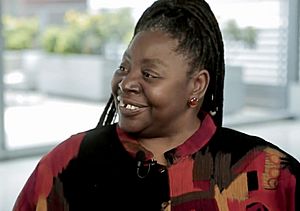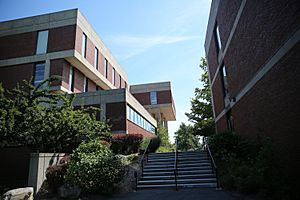Loretta Ross facts for kids
Quick facts for kids
Loretta Ross
|
|
|---|---|

Ross in 2017
|
|
| Born |
Loretta June Ross
August 16, 1953 Temple, Texas, U.S.
|
| Education | Howard University Agnes Scott College (BA) Emory University |
| Occupation |
|
Loretta J. Ross (born August 16, 1953) is an American teacher, feminist, and activist. She works to make sure everyone has fair choices about their health and bodies, especially women of color. As an activist, Ross has written about these important topics and the history of African American women.
Contents
Early Life and Education
Ross was born in Temple, Texas on August 16, 1953. She was the sixth of eight children in her family. Her father came from Jamaica and worked in the Army. He later worked for the Post Office and did other jobs to support his family. Ross's mother worked at home and also owned a music store.
Loretta went to integrated schools, meaning schools with students of all races. She was a very good student and skipped some grades. She earned high grades and honors in high school. Ross wanted to do well in school so she could have a good job. She did not want to do housework all her life like her mother.
In 1969, Ross had her son, Howard. Because of this, she lost a scholarship to Radcliffe College at Harvard University.
In 1970, Ross went to Howard University for college. While there, she became very involved in civil rights movements. She joined groups that discussed politics and worked to help people get fair housing.
In 2007, Ross earned her bachelor's degree from Agnes Scott College. She wrote a special project called Just Choices: Women of Color, Reproductive Health and Human Rights. She is now working on her PhD at Emory University in Atlanta, Georgia.
In 2018, Arizona State University hired her to teach a course on "Reproductive Justice." She has written three books on this topic. In 2019, she joined the faculty at Smith College as a visiting professor.
Fighting for Fairness and Change
Ross believes that the feminist movement has mostly focused on issues important to white women. These issues include equal pay and voting rights. However, Ross points out that other issues are very important for minority women and women of color. These include poverty and unfair treatment in the justice system.
Ross believes that racism is deeply rooted in our country. She says it shows up in obvious ways and in smaller, everyday actions. She wants these issues to be highlighted just as much as other feminist goals.
Coining "Women of Color"
In 1977, Ross and other activists created the term "women of color". They did this at the National Women's Conference. This term helped unite women from different minority backgrounds. It allowed them to talk about political and social issues together. Before this, the word "colored" was used, which had a hurtful history in America. Using "women of color" helped discussions about health and fairness be more respectful.
Organizing for Change
In August 1980, Ross organized the First National Conference on Third World Women and Violence. This meeting in Washington, D.C., brought together women from many different racial backgrounds. They worked together to create a network for people of color to fight against violence. Many worried that people from different backgrounds might not work well together. But the event was a big success. It allowed many different experiences to be heard and understood.
In 1985, the National Organization for Women (NOW) hired Ross. She became the director of their Women of Color Programs. Her job was to get more women of color involved in NOW. She also helped NOW work with other groups focused on issues for women of color. This partnership helped the feminist movement address issues that had been overlooked.
Ross also worked for the Black Women's Health Imperative. There, she helped organize the first national meeting for African American women's health rights. From 1991 to 1995, she was a director at the Center for Democratic Renewal. This group worked against hate groups. Ross also started the National Center for Human Rights Education in 1996. This center trains activists to fight injustice in the U.S.
Ross has also been active around the world. She helped organize a group of 1100 African American women to attend a big conference in Cairo in 1984. She also went to United Nations Women's Conferences in Copenhagen, Nairobi, and Beijing.
SisterSong and Reproductive Justice
In 1997, Ross helped start the SisterSong Women of Color Reproductive Justice Collective. This group works to improve policies that affect the health choices of people in marginalized communities. Ross was the National Coordinator for SisterSong from 2005 to 2012.
Ross was one of the African American women who first used the term "reproductive justice." This term means that everyone should have the right to make decisions about their own body and health. It also means having the resources to carry out those decisions.
In 2004, Ross was a leader for the March for Women's Lives in Washington, D.C. She also founded and led the National Center for Human Rights Education (NCHRE) in Atlanta, Georgia. This organization teaches people about human rights and how to fight injustice. NCHRE helps give a voice to those who might not otherwise be heard.
Ross has spoken about women's health and civil rights in many important places. These include the United Nations, the U.S. Congress, and the FDA. She has also appeared on TV shows like The Donahue Show and Good Morning America.
In 2022, Ross received a special award called a MacArthur Fellowship. This award recognized her work in connecting social justice, human rights, and reproductive justice.
Writing and Teaching
Ross has written several books and many articles. Her books focus on reproductive justice and the experiences of black women. In 2004, she co-wrote Undivided Rights: Women of Color Organizing for Reproductive Justice. This book shares the hidden history of how women of color have worked for health fairness.
Ross has taught at several colleges. From 2017 to 2018, she was a visiting professor at Hampshire College. She taught a course called "White Supremacy in the Age of Trump." She also taught at Arizona State University. Currently, she is a visiting professor at Smith College.

With Rickie Solinger, Ross co-authored Reproductive Justice: An Introduction. This book explains the field of reproductive justice, especially for women of color. Her book Radical Reproductive Justice was published in 2017. It discusses over twenty years of work by the SisterSong group.
Recently, Ross has spoken out against "call-out culture." She is working on a new book called Calling In the Calling Out Culture. She also wrote an article titled I'm a Black Feminist. I Think Call-Out Culture Is Toxic. In her article, she shares her own experiences with call-outs. She explains that call-outs can make people afraid to have important conversations.
Since 2020, Ross has offered online classes on her website. These include "White Supremacy in the Age of Trump" and "Calling in the Calling Out Culture."
Media Appearances
Ross has appeared on many TV shows and networks. These include NPR, CNN, BET, Good Morning America, Democracy Now!, and The Laura Flanders Show.
She was also featured in the book "The Persuaders: At the Front Lines of the Fight for Hearts, Minds and Democracy" by Anand Giridharadas.
Awards and Honors
Honorary Degrees
- Doctorate of Civil Law from Arcadia University (2003)
- Doctorate from Smith College (2013)
Selected Awards
- Black Women's Health Imperative, Community Health Activist Award (2008)
- Delta Sigma Theta, Pinnacle Leadership Award (2008)
- International Black Women's Congress, Oni Award (2010)
- Women Helping Women, Revolutionary Award (2011)
- Foundation for Black Women's Wellness Legacy Award (2015)
- National Women's Health Network Barbara Seaman Award for Activism in Women's Health (2015)
- Robert Coles "Call of Service" Award, Phillips Brooks House Association at Harvard University (2022)
- MacArthur Foundation Fellow (2022)
- National Women's Hall of Fame inductee (2024)
Works (selected)
- Reproductive Justice: An Introduction (2017) (with Rickie Solinger) ISBN: 9780520288188
- Radical Reproductive Justice: Foundation, Theory, Practice, Critique (2017) ISBN: 9781558614376
- "The Color of Choice: White Supremacy and Reproductive Justice" in Color of Violence: The INCITE! Anthology (2016) ISBN: 9780822363057
- Undivided Rights: Women of Color Organizing for Reproductive Justice, 2004.
- Just Choices: Women of Color, Reproductive Health and Human Rights (2001)
See also

